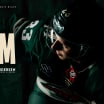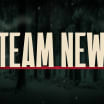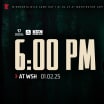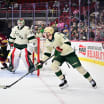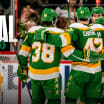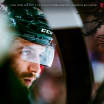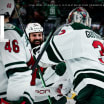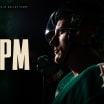That fall, Fenton, a native of Springfield, Mass., showed up on campus. Because of his glasses, Fenton earned the nickname "Doc" from another 1980 legend, Jack O'Callahan, a moniker that has managed to stick.
"No-nonsense, worked really hard, earned every single thing that he's been able to accomplish," Craig told Wild.com. "He's an honest, fair man and someone that you would want leading you."
Fenton served as an assistant GM for more than a decade before finally getting the opportunity to run his own operation with the Wild.
But it wasn't the first time he'd had to bide his time.
Fenton dressed for just two games as a freshman at BU but never stepped foot over the boards. He was on the roster, but never accumulated any statistics. It wasn't an easy time for Fenton, who was young and eager to show his coach, the legendary Jack Parker, that he could be an instant contributor.
Still, for a kid from the western part of Massachusetts, setting foot on the BU campus with an opportunity to put on a Terriers jersey, Fenton had to pinch himself.
Along with O'Callahan and Craig, Fenton also got a chance to play with 1980 Olympian Dave Silk. Craig made him a better player, though, and watching him in his element was a treat.
"He was easy going for a goaltender, you know how we describe goalies sometimes, but he was not as different as I've met in my travels along the way," Fenton said. "Very easy, very friendly, but very competitive.
"The thing that not a lot of people know is just how competitive this guy was when he was playing goal. You saw it certainly in the 1980 Olympics, but getting to practice with him every day ... him never giving up on a shot, him making you shoot it seven or eight times and still not getting it in was sort of his forte. He by no means took a day off."
Fenton and Craig spanned just one year together at BU, but could have lasted another six months had things gone just write a couple of years later.
Fenton tried out for the 1980 Olympic team. After not making the team, he went to BU for his sophomore season and posted 12 goals and 33 points in 28 games, proving to Parker he did have what it took to be an impactful college player.
Now, Fenton makes his livelihood in Minnesota, much like Craig did for several months in 1980 and for part of the 1983-84 season when he played for the Minnesota North Stars.
Craig was in the Twin Cities last week with a corporate group at the Wild game against the San Jose Sharks. He made the "Let's Play Hockey!" call before the game, but before that, stopped by Herbie's On the Park, where Fenton and Craig were able to reconnect for the first time in a few years.
It was the first time Craig had seen the new statue of his 1980 coach, St. Paul native Herb Brooks, which was unveiled in January of 2017.
Craig said he had seen the previous, much smaller statue, but that it didn't properly represent the mythical character of Brooks.
The current bronze figure depicts Brooks, with his hands raised in the air, moments after the United States upset the Soviet Union in the 1980 Olympics, arguably the greatest upset in sports history.
The following day, the U.S. defeated Finland to secure the gold medal.
"A statue is supposed to be larger than life, and that first one was not," Craig said. "Now you look at it and you say, 'OK, that really stands out.' It was surreal. For what he's done for this community, it's a great honor and for me, it's a great honor to be a part of that moment [depicted by the statue]."
Craig, a native of North Easton, Mass. who currently resides in St. Petersburg, Fla., said coming to the Twin Cities as a 21-year-old to train with the Olympic team in 1979 and later playing for the North Stars had a lasting impact on his own life.
"Coming to Minneapolis, it really helped create the foundation of the person I am today," Craig said. "The people have always been tremendous and I have incredible life-long friends here. I still consider Minnesota a home."

